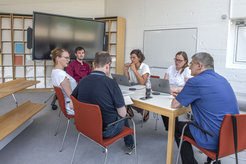Introduction: Support Services at the Institute
Support services play a vital role in the smooth running of the Institute. The four non-scientific service units—Administration, Central Services, Press and Public Relations, and Technical Services—are led by the Head of Administration. The scientific service units—previously comprising Central IT and Library and Research Information—report to the Managing Director.
Collaboration and collective impact is becoming increasingly important for all service units. In recent years, the units have joined forces to advance several Institute-wide projects that benefit all Centers and Groups.
Library and Research Information Unit
One initiative centers around the development and professionalization of the Institute’s Research Data Management (RDM) services, which have been incorporated into the portfolio of the Library and Research Information Unit. This process began with a working group on RDM set up by the directors in 2018, leading to the appointment of an RDM Coordinator in March 2021. In 2022, the RDM team success fully integrated the Castellum project as an Institute-wide tool, including the development of a data protection-compliant participant database. In 2023, the RDM team launched an Institute-wide study registration tool.
Recognizing the growing importance of Open Science, the RDM Coordinator has engaged in various activities to facilitate easy and open access to research results (e.g., publications, data, software) and to promote transparency within the research process as a whole.
Scientific Service Unit and Third-Party Funding
In March 2022, the Scientific Service Unit was established, headed by the newly appointed Institute Research Coordinator. This development reflects the management’s commitment to centralizing infrastructure, meeting the demands of an increasingly interdisciplinary workplace, and enhancing the professionalization of the services provided.
Central IT Unit
The Central IT Unit plays a critical role at the Institute by ensuring that all IT operations run smoothly. The Unit consists of two teams: Infrastructure and Service Desk. The Infrastructure team is responsible for constructing and maintaining crucial elements of the Institute’s IT systems, including the Internet infrastructure, WiFi, networks, and data storage. The Service Desk team provides indispensable support to the Institute staff in their day-to-day work, serving as a one-stop point of contact for any IT issues, including troubleshooting, technical support, and service requests. In 2022, the Institute established an IT Advisory Board to facilitate the exchange of expertise and knowhow across all Centers and Groups. The Board brings together scientific IT staff from throughout the Institute to discuss and make important decisions in consultation with Central IT. All IT staff members benefit from better insights into developments in other areas of the Institute and from the opportunity to identify and leverage synergies.
Max Planck Dahlem Campus of Cognition (MPDCC)
A further area of major Institute-wide change is the establishment of the Max Planck Dahlem Campus of Cognition (MPDCC) as a core facility in Dillenburger Straße. Over the past decade, the Institute has transitioned from a predominantly humanities-focused research institution to one that emphasizes experimental approaches. This shift has fueled a growing demand for laboratory infrastructure and innovative imaging techniques. In 2017 and 2018, the Max Planck Society approved the construction of a wave field synthesis audio lab, as well as the purchase of a second 3T MRI scanner and a 7T MRI scanner. With the recent acquisition of the Dillenburger Straße building, the Institute is now in a position to set up a core facility with the necessary laboratories. The Max Planck Dahlem Campus of Cognition was launched in 2021 as the organizational umbrella for this core facility.

